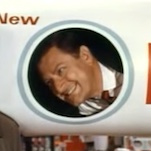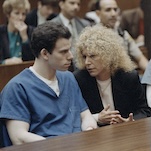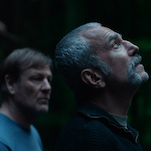The minimalist sci-fi mindbender Coherence boasts a scenario as tried and true as the walking dead: Bickering individuals hole up in a house during a crisis, discovering that the threat looming beyond their walls may pale in comparison to the conflict happening within them. There’s a wrinkle in the design this time, however, and it’s that the characters are their own worst enemies not just in a figurative sense, but in a literal one, too. Confused? Writer-director James Ward Byrkit has the answers, and he’s not stingy about providing them. What separates his film from other exercises in Twilight Zone trickery is its refusal to play coy with a high concept. Unlike, say, the feature-length rug-pull The Signal, Coherence doesn’t get off on withholding. It would rather milk its premise for all it’s worth than stockpile secrets. The result is an uncommonly clever genre movie, reliant not on special effects—of which there are basically none—but on heavy doses of paranoia.
It helps, too, that Coherence has actual characters, rather than amateur investigators for the audience to mentally outpace. Very similar in setup to last year’s underrated doomsday comedy It’s A Disaster, the film finds several thirtysomething friends reuniting for a dinner party on the night a comet is scheduled to pass through the planet’s atmosphere. There’s enough latent resentment in this group dynamic to fuel a straightforward indie drama, and Coherence initially fits that bill quite snugly, its largely unknown cast—the most familiar face is Nicholas Brendon, of Buffy The Vampire Slayer—spewing improvised, overlapping dialogue in front of a jittery, handheld lens. Soon, however, the normal gathering is disrupted by a series of abnormal occurrences: Cell phones stop working, the Internet goes down, and all the lights in the neighborhood flicker off, save for those illuminating a big house at the end of the street. It’s when the guests go to chat with their lucky neighbors, and discover some… similarities in their circumstances, that things really go off the rails.
Again, a more ordinary film might have treated Coherence’s fantastical conceit as an endgame, the final reveal everything is building toward. Here, the cards are laid on the table early, allowing Byrkit to exploit his material for both metaphoric resonance and complicated narrative developments. (The discovery of a series of numbered photographs, for example, leads to a truly staggering payoff.) Admittedly, there’s a certain implausibility to the rational way these bewildered Gen Xers reason through the weirdness, as though they were trading Lost theories instead of wrapping their heads around their own predicament. That they uncover the truth about the situation in a conveniently accessible physics book is sillier still. However, once it becomes clear that the heroes aren’t the only ones making plans and sorting things out, fans of relentlessly brainy science-fiction will be too geeked to care. Casting Brit Marling look-alike Emily Baldoni in the lead almost feels like a sly joke; if nothing else, Coherence shows how something like Another Earth might work better if it actually believed in its premise. A mind-blowing idea is, after all, a terrible thing to waste.








































